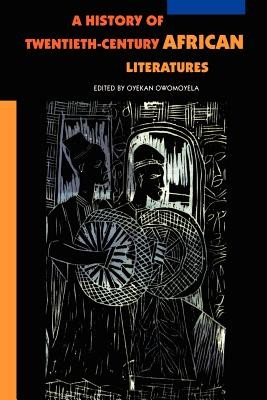
- We will send in 10–14 business days.
- Author: Oyekan Owonoyela
- Publisher: University of Nebraska Press
- ISBN-10: 080328604X
- ISBN-13: 9780803286047
- Format: 15 x 22.6 x 2.5 cm, softcover
- Language: English
- SAVE -10% with code: EXTRA
A History of Twentieth-Century African Literatures (e-book) (used book) | bookbook.eu
Reviews
Description
African literatures, says volume editor Oyekan Owomoyela, testify to the great and continuing impact of the colonizing project on the African universe. African writers must struggle constantly to define for themselves and other just what Africa is and who they are in a continent constructed as a geographic and cultural entity largely by Europeans. This study reflects the legacy of colonialism by devoting nine of its thirteen chapters to literature in Europhone languages--English, French, and Portuguese. Foremost among the Anglophone writers discussed are Nigerians Amos Tutuola, Chinua Achebe, and Wole Soyinka. Writers from East Africa are also represented, as are those from South Africa. Contributors for this section include Jonathan A. Peters, Arlene A. Elder, John F. Povey, Thomas Knipp, and J. Ndukaku Amankulor. In African Francophone literature, we see both writers inspired by the French assimilationist system and those influenced by Negritude, the African-culture affirmation movement. Contributors here include Servanne Woodward, Edris Makward, and Alain Ricard. African literature in Portuguese, reflecting the nature of one of the most oppressive colonizing projects in Africa, is treated by Russell G. Hamilton. Robert Cancel discusses African-language literatures, while Oyekan Owomoyela treats the question of the language of African literatures. Carole Boyce Davies and Elaine Savory Fido focus on the special problems of African women writers, while Hans M. Zell deals with the broader issues of publishing--censorship, resources, and organization.
EXTRA 10 % discount with code: EXTRA
The promotion ends in 10d.16:14:31
The discount code is valid when purchasing from 10 €. Discounts do not stack.
- Author: Oyekan Owonoyela
- Publisher: University of Nebraska Press
- ISBN-10: 080328604X
- ISBN-13: 9780803286047
- Format: 15 x 22.6 x 2.5 cm, softcover
- Language: English English
African literatures, says volume editor Oyekan Owomoyela, testify to the great and continuing impact of the colonizing project on the African universe. African writers must struggle constantly to define for themselves and other just what Africa is and who they are in a continent constructed as a geographic and cultural entity largely by Europeans. This study reflects the legacy of colonialism by devoting nine of its thirteen chapters to literature in Europhone languages--English, French, and Portuguese. Foremost among the Anglophone writers discussed are Nigerians Amos Tutuola, Chinua Achebe, and Wole Soyinka. Writers from East Africa are also represented, as are those from South Africa. Contributors for this section include Jonathan A. Peters, Arlene A. Elder, John F. Povey, Thomas Knipp, and J. Ndukaku Amankulor. In African Francophone literature, we see both writers inspired by the French assimilationist system and those influenced by Negritude, the African-culture affirmation movement. Contributors here include Servanne Woodward, Edris Makward, and Alain Ricard. African literature in Portuguese, reflecting the nature of one of the most oppressive colonizing projects in Africa, is treated by Russell G. Hamilton. Robert Cancel discusses African-language literatures, while Oyekan Owomoyela treats the question of the language of African literatures. Carole Boyce Davies and Elaine Savory Fido focus on the special problems of African women writers, while Hans M. Zell deals with the broader issues of publishing--censorship, resources, and organization.


Reviews